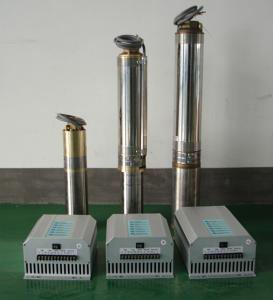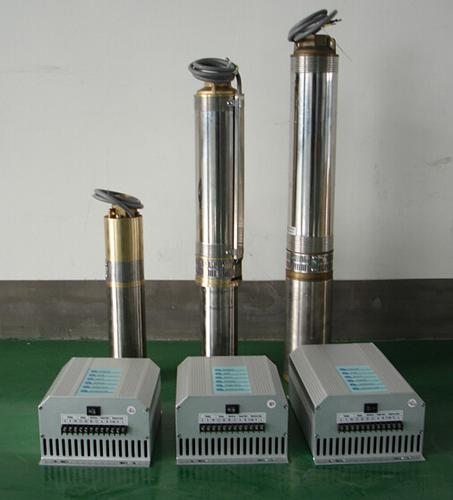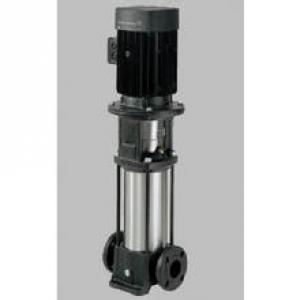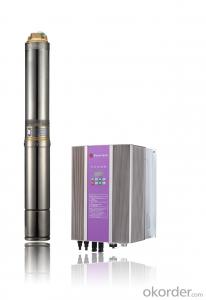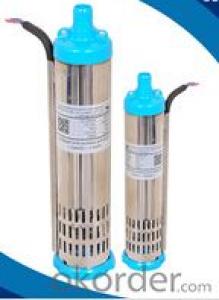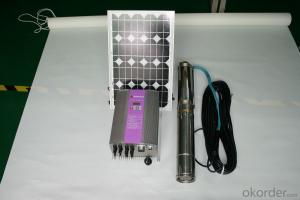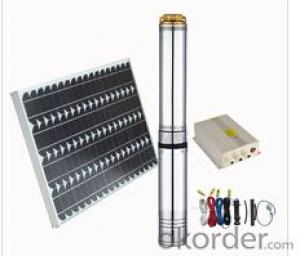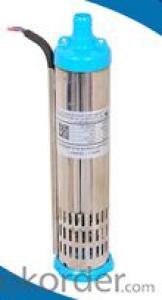Best Solar Pump
- Loading Port:
- China Main Port
- Payment Terms:
- TT OR LC
- Min Order Qty:
- -
- Supply Capability:
- -
OKorder Service Pledge
OKorder Financial Service
You Might Also Like
Item Description :
This superb new addition to our solar fountain range comes with a 10w solar panel,and a powerful fountain pump that is capable of producing fountains of up to 2m in height. As well as being easy to set up and use.Instruction manual is supplied for assembly and maintenance.
Solar Fountain Key Features :
Powered by direct sunlight
No high voltage electric mains required
Safe for children
Max. height of fountain: 2M
Max. flow capacity: 800 L/H(176 GAL)
10W Polycrystalline solar panel included
18V DC brushless pump
Solar Pump Features :
Can produce fountains up to : 2M (tube height) 1.4M (fountain height)
Comes with multiple nozzle accessories
Cable Length : 5M
Solar Panel Features :
10W peak power.
Polycrystalline highly efficient solar panel
Comes mounted in aluminium frame
Comes with ground stake and rotating knob so you can angle your panel toward the sun
What You Will Get :
10W solar panel
Solar pump
Ground Sake
Nozzle accessories
Precautions :
DO NOT alter or change the product itself or its components
Operate pump in freshwater only, never above 50 degrees celsius
Keep away from flammable liquids
Do not connect to any other power supply other than the included
- Q: Can a solar pump be used for water wells?
- Indeed, water wells can indeed benefit from the use of a solar pump. These pumps offer an effective and sustainable solution for extracting water from wells. By utilizing solar energy to power the pump, the reliance on electricity or fuel is completely eliminated. Consequently, solar pumps prove to be particularly useful in remote locations where grid power is inaccessible, making them an ideal choice for water wells situated in such areas. Not only are these pumps cost-effective and reliable, but they also require minimal maintenance. Furthermore, it is worth noting that solar pumps can be tailor-made to meet the specific water requirements of various well depths and flow rates, thereby ensuring efficient water extraction. All in all, solar pumps represent a viable and eco-friendly alternative for pumping water from wells.
- Q: Are there any regulations on the disposal of solar pump components?
- The disposal of solar pump components is regulated by various environmental regulations and guidelines to ensure proper handling and minimize the impact on the environment. In the United States, for example, the Environmental Protection Agency (EPA) oversees the disposal of electronic waste, which includes solar pump components. The EPA has established specific guidelines and regulations to prevent the release of hazardous materials into the environment. In addition to federal regulations, many states and local governments have their own regulations on the disposal of electronic waste, including solar pump components. These regulations require individuals and businesses to recycle or dispose of electronic waste through approved channels, such as licensed recycling facilities or collection events. It is important to note that solar pump components may contain hazardous materials, such as lead, cadmium, or mercury. These materials can be harmful to human health and the environment if not disposed of properly. Therefore, it is crucial to follow the regulations and guidelines set forth by the relevant authorities to ensure the safe and environmentally friendly disposal of these components. To determine the specific regulations applicable to the disposal of solar pump components in a particular area, it is recommended to consult with local environmental agencies, waste management authorities, or recycling facilities. These entities can provide accurate and up-to-date information on the proper disposal methods and any specific regulations that must be followed.
- Q: Can a solar pump be used for water supply in industrial applications?
- Yes, a solar pump can be used for water supply in industrial applications. Solar pumps are increasingly being utilized in industrial settings due to their energy efficiency, cost-effectiveness, and environmental benefits. These pumps can provide a reliable and sustainable water supply for various industrial processes such as irrigation, cooling systems, and wastewater management. Additionally, solar pumps can be easily integrated into existing industrial infrastructure, making them a viable option for water supply in industrial applications.
- Q: Are solar pumps suitable for all types of water sources?
- No, solar pumps may not be suitable for all types of water sources. The suitability of solar pumps depends on various factors such as the depth of the water source, the quality of water, and the required flow rate. It is important to assess these factors before determining if a solar pump is suitable for a particular water source.
- Q: Can a solar pump be used in areas with high air pollution levels?
- Certainly! Solar pumps can be utilized in areas with high levels of air pollution. These pumps rely on sunlight for electricity generation and are impervious to air pollution, as long as the solar panels receive adequate sunlight. Nonetheless, it is crucial to regularly cleanse the solar panels to ensure optimal efficiency, as air pollution can accumulate and hinder their effectiveness. Furthermore, it is advisable to employ top-notch solar panels equipped with anti-reflective coatings to minimize the impact of air pollution on the system's performance. All in all, although air pollution may indirectly affect the maintenance and efficiency of a solar pump, it does not hinder its utilization in areas with high pollution levels.
- Q: Can a solar pump be used in remote locations without access to electricity?
- Yes, a solar pump can be used in remote locations without access to electricity. Solar pumps are designed to operate using solar panels and do not require a direct connection to the electrical grid. By harnessing solar energy and converting it into electricity, solar pumps can provide a reliable and sustainable water pumping solution in off-grid areas.
- Q: What is the lifespan of a solar panel used in a solar pump system?
- The lifespan of a solar panel used in a solar pump system can vary depending on various factors such as the quality of the panel, maintenance practices, and environmental conditions. On average, a well-maintained and high-quality solar panel can last anywhere from 25 to 30 years. However, it is important to note that the efficiency of the panel may gradually decrease over time, resulting in a slightly reduced output. Regular cleaning, monitoring, and maintenance can help maximize the lifespan and performance of the solar panel in a solar pump system.
- Q: Can a solar pump be used in areas prone to hurricanes or strong winds?
- Yes, a solar pump can be used in areas prone to hurricanes or strong winds. However, it is important to ensure that the solar pump system is securely installed and protected to withstand these extreme weather conditions. This may involve using sturdy mounting structures, reinforcing the system, and implementing proper maintenance and inspection protocols.
- Q: How does a solar pump work?
- A solar pump works by harnessing energy from the sun through solar panels. The panels convert sunlight into electricity, which powers the pump to draw water from a source such as a well or a reservoir. This renewable energy solution eliminates the need for grid electricity or fuel, making it both cost-effective and environmentally friendly.
- Q: How does a solar pump compare to a traditional electric pump?
- A solar pump differs from a traditional electric pump in terms of its energy source. While a traditional electric pump relies on grid electricity, a solar pump utilizes energy from the sun, making it more sustainable and environmentally friendly. Solar pumps are typically more cost-effective in the long run as they do not require continuous electricity consumption. Additionally, solar pumps can be installed in remote areas without access to electricity, making them a suitable option for off-grid locations. However, solar pumps may have lower water delivery rates compared to electric pumps, depending on the size and capacity of the system.
Send your message to us
Best Solar Pump
- Loading Port:
- China Main Port
- Payment Terms:
- TT OR LC
- Min Order Qty:
- -
- Supply Capability:
- -
OKorder Service Pledge
OKorder Financial Service
Similar products
Hot products
Hot Searches
Related keywords
